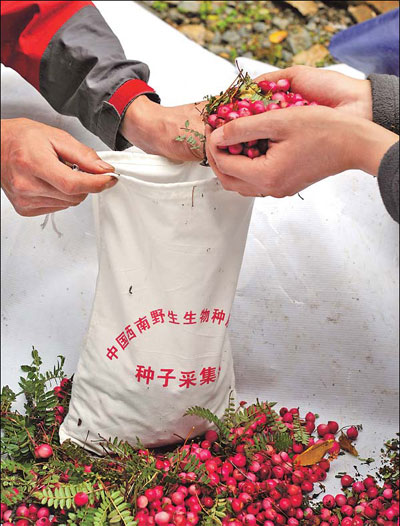'Noah's Ark' gives rare plants seeds of survival
 |
|
Botanists collect samples during an expedition into the wilds of Yunnan, the Kingdom of Plants. |
Lucky discovery
With an overwhelming number of species to collect, expedition teams (usually of three or four) begin by targeting those that come under the "three Es": endangered, endemic and economically important.
Botanists can spend months in the field to collect at least 10,000 seeds per sample, although the actual number can range from 100 to 100,000. Some plants produce a limited number of seeds and others plants' seeds can be small or mature slowly. (Seeds from ginseng, the popular Chinese herbal medicine, need 16 to 22 months to ripen, making it impossible to collect enough seeds in a single trip.)
"Sometimes the seeds regenerate only after one or two months, so the teams return to the same area several times," said Qin Shaofa, who has worked in the bank's seed management division for two years. "It can really just depend on luck."
It was luck that led Dr Shui Yuming and students from the Kunming institute to stumble upon a group of plants with slender, lantern-like yellow flowers in Yunnan in 2006.
The plant turned out to be paraisometrum mileense, an endemic species first discovered by a French missionary in 1906 and once thought to be extinct. Its seeds have since been stored and the wild population is being monitored.
With the help of 58 universities and institutes across China, the Kunming Institute of Botany has already covered much of China's western regions. Its experts also hold joint exercises to allow collectors to gain experience and knowledge about dealing with different landscapes and plant varieties.
Although seed collection is the foundation for the botanists' work, the purpose of the bank extends beyond simply storing and cataloguing genetic diversity.
"Seed banks are a kind of insurance policy but they're much more than that," said Paul Smith, director of the Millennium Seed Bank at Kew Gardens in England, who added that plants have the potential to solve the world's most pressing challenges.
"What people often don't realize is that you need seeds to develop biofuels, and crops and fruit trees for food security," he said. "And, of course, you need seeds to add more forest."
Climate change poses a particular risk for crops, which may have lost key genetic traits due to domestication and could be more susceptible to temperature fluctuations and frequent natural disasters.
Only research can help unearth the huge potential of wild plants in producing hardier crops, said Gao Lizhi, director of Kunming seed bank's plant germplasm and genomics center.
"The question for most people is whether the plants are useful but actually they're all useful. It just depends on how much we know about them," he said.
Gao, who has collected germplasm from more than 2,000 varieties of rice, emphasized that wild plants' genes can be used to develop breeds of wheat, corn and rice - essential staples in Chinese agriculture - that are resistant to disease, drought and pests. He is also leading a project to sequence the tea tree and oil tea tree genomes, which could impact not only Yunnan's tea production but also the biofuel industry.
"Yunnan is mountainous and not suitable for building traditional factories," he said, "but it can provide many environmentally friendly natural factories."
The shortage of land in China means food production takes priority, leaving little room to plant sources of biofuel, explained Gao. Yet, oil tea trees can help resolve this conflict because they produce high-quality oil for cooking and can grow in areas previously considered unusable for farming.
Based on their oil production, 1.6 hectares of oil tea trees could free up about half a hectare of canola for industrial purposes, such as making biodiesel, he said.
Research on plants has also revealed their importance for modern medicine. A notable example from China is the malaria drug artemisinin, which was first isolated from the leaves of the wormwood plant. The seed bank also stores seeds from the Himalayan yew, whose bark is a source of the anti-cancer drug, Taxol.
However, there is often a long interval between collecting seeds and understanding a plant's properties (even the species' name) due to a shortage of seed biologists, taxonomists and pre-existing data.
Of the 30,000-plus samples at the Kunming seed bank, only about 5,000 species have been identified.
"Usually the seeds come first and the information comes later," said Qin.
 0
0 






